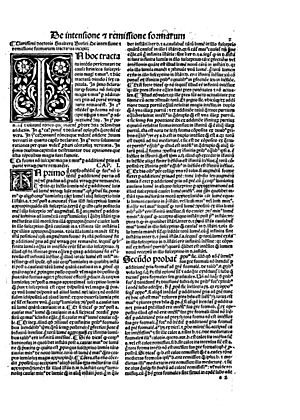Walter Burley facts for kids
Walter Burley (born around 1275 – died 1344/45) was a very smart English thinker. He was a scholastic philosopher, which means he studied big ideas about life and knowledge, often linking them to religious beliefs. He was also a logician, someone who studies how to reason correctly. Walter Burley wrote at least 50 books and papers!
He studied at Merton College, Oxford, and became a Master of Arts in 1301. Later, he spent 16 years in Paris, studying at the famous Sorbonne. He then worked for 17 years in courts in England and Avignon, helping important people. Walter Burley often disagreed with another famous thinker, William of Ockham, especially about logic and how the natural world works. People called him the Doctor Planus and Perspicuus, which means "The Clear and Sharp Teacher."
Early Life and Studies
Walter Burley was born in 1274 or 1275. He might have been born in a place called Burley in Yorkshire, England. We don't know much about his childhood.
In 1309, he became a rector in Welbury, Yorkshire. A rector is like a priest in charge of a church. But Walter didn't actually work there. Instead, he hired someone else to do the job. He used the money from this position to pay for his studies in Paris. While in Paris, he studied the Sentences, a famous book of religious ideas. He also probably learned about the ideas of William of Ockham there.
Working for Important People
Walter Burley became involved in politics after King Edward II of England was removed from power in 1327. His first big job was to try and get Thomas, 2nd Earl of Lancaster recognized as a saint. Thomas had been a leader against King Edward II and was seen as a hero by many.
Walter Burley went to the Pope's court in Avignon to ask Pope John XXII directly. It was a funny coincidence that William of Ockham, the thinker Burley often disagreed with, was also in Avignon at the same time! Ockham had been called there to answer questions about some of his ideas.
Walter Burley worked closely with Richard de Bury, a man who loved books and supported arts and sciences. Richard de Bury became Walter's helper and friend. Richard even asked Walter to translate some of the ancient Greek philosopher Aristotle's writings into English.
Church Career
By 1324, Walter Burley had become a master of theology, meaning he was an expert in religious studies. In 1327, he became a canon at Chichester, a church position given by the Pope. He later moved to Wells in 1332, where his friend Richard de Bury was the dean (a senior church leader).
Richard de Bury was involved in a big political change in 1330. This change led to Edward III becoming king. In 1333, King Edward III made Richard de Bury the Bishop of Durham. A bishop is a very high-ranking church leader. Richard de Bury also held important government jobs, like Lord Treasurer and Lord Chancellor. He brought together many smart people, including Walter Burley, to work with him.
Ideas and Writings
Walter Burley was one of the first thinkers in the Middle Ages to understand how important "propositional calculus" was. This is a way of thinking about how whole sentences or statements connect to each other logically. Before him, most logicians focused more on "term logic," which looks at how individual words or terms relate.
He also wrote many comments on Aristotle's book Physics, which is about how the natural world works. One of his works was called De Primo et ultimo instanti, and a longer one was Expositio in libros octo de physico auditu.
Walter Burley wrote 39 commentaries on Aristotle's works and 32 other papers and questions. Many of these have not been fully studied yet.
One of his most important books was De Puritate Artis Logicae (On the Purity of the Art of Logic). He wrote two versions of this book:
- The shorter version (before 1324)
- The longer version (1325–1328)
In this book, Walter Burley talked about when complex sentences are true. He also gave rules for how to make correct logical guesses. This book was written after William of Ockham's Summa Logicae (around 1323), and Burley's book might have been partly a response to Ockham's ideas.
Some of his other works include:
- In Aristotelis Perihermenias (Questions on Aristotle's Perihermenias, 1301)
- De consequentiis (On Consequences, 1302)
- De suppositions (On Suppositions, 1302)
- De obligationibus (On Obligations, 1302)
- De ente (On Being, around 1310)
- Tractatus de formis (Treatise on Forms, 1324-1326)
- Tractatus de universalibus (Treatise on Universals, after 1337)
 | Aurelia Browder |
 | Nannie Helen Burroughs |
 | Michelle Alexander |


